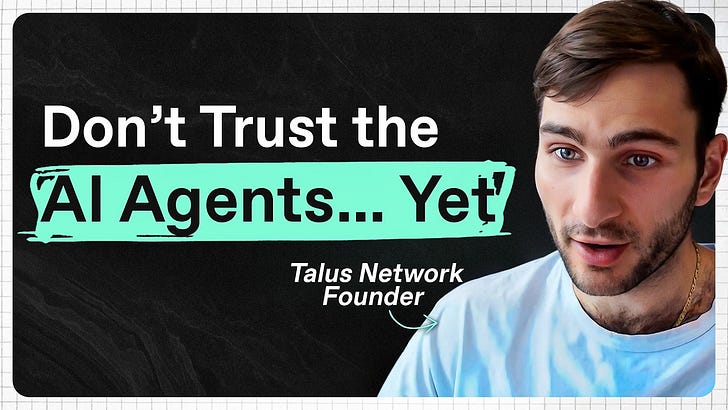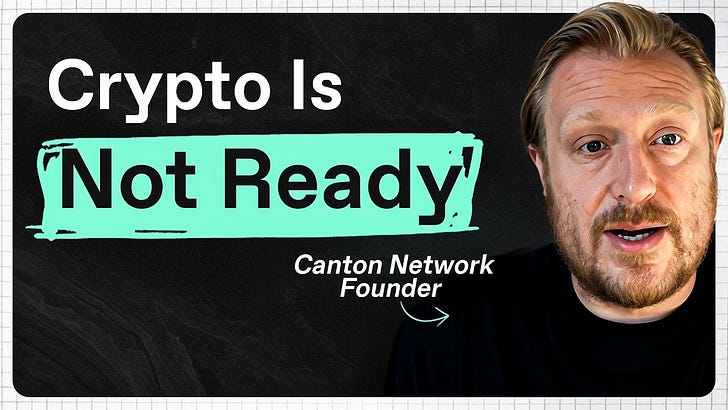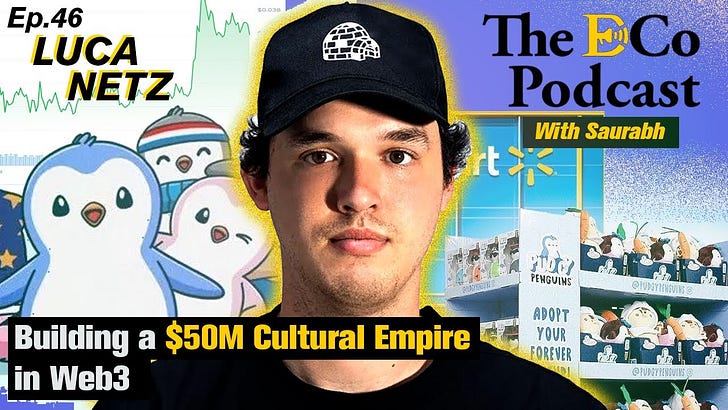Discover The DCo Podcast
The DCo Podcast

 The DCo Podcast
The DCo Podcast
Author: Saurabh Deshpande
Subscribed: 4Played: 59Subscribe
Share
© Decentralised.co
Description
Stories with depth, insight & data covering all things Web3.
For builders. By builders.
www.decentralised.co
For builders. By builders.
www.decentralised.co
51 Episodes
Reverse
Timothy Stebbing is CTO of House of Doge and Director at the Dogecoin Foundation. He spent 25 years in open source development before joining Dogecoin in 2021.In this episode, we discuss:• Why Timothy tells his friends and family to stay away from crypto• How 2% inflation was accidentally good design• Why Bitcoin lost the payments battle• The growth from five developers to over a hundred• Managing a community of memers and institutional investors• What Dogecoin is actually building This is a public episode. If you would like to discuss this with other subscribers or get access to bonus episodes, visit www.decentralised.co
AI is shifting from chat interfaces to agents that act, earn, and participate in real economic activity. Mike Hanono, CEO of Talus Network, explains how this agentic economy takes shape and why it needs crypto rails. We explore idol.fun as the first live example of agents competing and generating value. This is a public episode. If you would like to discuss this with other subscribers or get access to bonus episodes, visit www.decentralised.co
Eric Saraniecki has spent the past decade building the infrastructure that large financial institutions need to participate in crypto. As the Co-Founder and Head of Product at Digital Asset and a core builder behind Canton Network, Eric has a perspective that few operators in this industry share. He works directly with banks, asset managers, and market operators on the problems that define institutional adoption. This conversation outlines what those institutions actually require and why most blockchain systems were not designed for their needs. This is a public episode. If you would like to discuss this with other subscribers or get access to bonus episodes, visit www.decentralised.co
The conversation with Justin Waldron, co-founder of Zynga and now founder of Open Game Protocol, is a masterclass in how distribution models evolve in games and how Web3 could power the next one. This is a public episode. If you would like to discuss this with other subscribers or get access to bonus episodes, visit www.decentralised.co
AI agents are cheap to launch and impossible to trust. This episode is for people building and backing growth-stage crypto startups: how do you pick between thousands of on-chain “trading bots,” research assistants, and execution agents when most collapse in live conditions? Andrew Hill, CEO of Recall, lays out how Recall is trying to become crypto’s neutral trust layer for agents with live competitions, skill markets, and a ranking system you can actually underwrite.Key Moments00:00:00 - Introduction to Recall00:01:26 - Introduction to Andrew Hill and Recall00:01:45 - The Need for a Curation Layer for AI Models00:03:08 - Recall's Vision and Functioning00:05:26 - The Role of Competitions in Recall00:10:45 - The Future of Recall and AI Agents00:15:26 - Demand for Agentic Systems in Trading00:17:47 - The Evolution of AI Agents and Their Capabilities00:20:17 - The Growing Role of AI Agents in Crypto Trading00:26:51 - The Approach to Evaluating Subjective Skills00:28:29 - The Behavior of AI Models00:32:45 - The Role of Curators and Boosters in Recall00:36:11 - The Future of AI Evaluation and Alignment00:41:05 - The Role of Recall's Token in the AI Marketplace00:43:38 - Revenue Lines for Recall00:45:41 - The Role of Human Judges in Recall00:48:11 - Challenges for Agent Builders and Future Prospects00:49:08 - Potential Risks and Fears for Recall00:49:20 - The Battle of Decentralized vs Centralized Intelligence00:50:43 - The Future of AI Agents and Complex Tasks00:51:19 - The Threat of a Single, All-Powerful Agent00:52:13 - Recall's Achievements and What to Look Forward To This is a public episode. If you would like to discuss this with other subscribers or get access to bonus episodes, visit www.decentralised.co
In this episode, Luca Netz shares how he took a failing NFT collection and turned it into one of the fastest-growing Web3 brands. We dive into his three-pillar model of ecosystem, attention, and revenue; and explore how Pudgy has sold over 1.5M toys through Walmart and Target, signed 45+ licensing deals, and built a business where culture and cash flow compound.In the episode, talk about: • How 80% of Pudgy’s revenue comes from licensing (45+ active deals) • Why arcade machines, toys, and games beat token drops in driving brand value • What “tokenized culture” actually means—and how it becomes a moat • The future of consumer crypto and Luca’s bet on Abstract’s Portal • Why the next big crypto success might not feel like crypto at all • How to fix crypto’s broken consumer journey • How to turn IP into retail + social currency without losing the core community. Chapters 0:00 – Intro 2:45 – Tokenising Culture, Memes & Influence 10:48 - The role of speculation 15:30 – The Three Pillars of Crypto Value: Ecosystem, Attention & Revenue 21:55 – The Pudgy Playbook: Community, Marketing & $50M Revenue 27:56 – What Luca knew when he bid $2.5 million on Pudgy IP 30:45 – What's Broken in Consumer Crypto 38:20 – Fixing Onboarding: Abstract Portal & The Future of Adoption 49:43 – Building for Gen Z & Gen Alpha 51:10 – Lessons from $PENGU Airdrop 54:09 – Is Token a Product? If you want to know more about Luca, we recently published a story on him here — https://www.thetokendispatch.com/p/the-luca-netz-story 👥 Guest: Luca Netz – CEO at Pudgy Penguins and Igloo Twitter: https://x.com/LucaNetz 🎙️ Host: Saurabh Deshpande – DCo Podcast Twitter: https://x.com/desh_saurabh 📬 Stay Updated: Subscribe to DCo Newsletter → https://www.decentralised.co/subscribe Follow DCo on Twitter → https://x.com/Decentralisedco This is a public episode. If you would like to discuss this with other subscribers or get access to bonus episodes, visit www.decentralised.co
We sit down with Androo and Andy from HypurrFi who are building at the intersection of on-chain credit and real-world usability.While most DeFi protocols treat borrowing as a one-time action, HypurrFi is making debt dynamic. Think refinancing, real-time spending, and routing capital across markets—without closing your position.We cover:— Why HypurrFi is focused on active debt management— How they're using USDXL (a synthetic dollar) as a programmable debt rail— Why their on-chain card integration changes how crypto holders can spend— How they’re thinking about traders, tax-advantaged holders, and capital efficiency— Why building on Hyperliquid gives them a unique edge, and what the challenges are— What “debt servicing” really means (and how it differs from basic lending)Timestamps —00:00: Introduction01:30 Backgrounds02:00: The Hyperliquid Ecosystem10:20: "Everyone Is Coming" Thesis20:00: HyperFi's Core Products & Vision32:00: The Card & The Philosophy of Debt46:00: Debt Servicing58:00: Competition👥 Guest:Androo Lloyd – Co-Founder at HypurrFiTwitter: https://x.com/androolloydAndy – Head of Growth at HypurrFiTwitter: https://x.com/andyhyfi🎙️ Host: Saurabh Deshpande – DCo PodcastTwitter: https://x.com/desh_saurabh📬 Stay Updated:Subscribe to DCo Newsletter → https://www.decentralised.co/subscribeFollow DCo on Twitter → https://x.com/Decentralisedco This is a public episode. If you would like to discuss this with other subscribers or get access to bonus episodes, visit www.decentralised.co
Kinetiq co-founder and Hyperliquid contributor Omnia joins to unpack how Hyperliquid evolved from a DEX into a liquidity layer, what HIPs unlock, and why apps like Phantom and Kinetiq are treating it as default.Chapters —00:00 Podcast Opening & Disclaimer00:19 Kinetic's Launch & Market Context03:20 Hyperliquid's Core Thesis11:33 Hyperliquid Technical Architecture20:30 Understanding Hyperliquid Improvement Proposals (HIPs)36:10 Kinetiq's Staking Solutions & Platform Decentralisation46:06 Custody and Compliant Staking on Hyperliquid01:01:24 Builder Codes and On-Chain Asset Growth👥 Guest: Omnia – Co-founder at Kinetiq Twitter: https://x.com/0xOmnia🎙️ Host: Saurabh Deshpande – DCo Podcast Twitter: https://x.com/desh_saurabh📬 Stay Updated: Subscribe to DCo Newsletter → https://www.decentralised.co/subscribeFollow DCo on Twitter → https://x.com/Decentralisedco This is a public episode. If you would like to discuss this with other subscribers or get access to bonus episodes, visit www.decentralised.co
While everyone's been copying MicroStrategy's Bitcoin strategy, Sol Strategies took a different approach. CEO Leah Wald and CTO Max Kaplan join me to discuss why they're building actual infrastructure around Solana instead of just holding tokens. Sol Strategies is a publicly listed company (CSE: HODL) - formerly Cypherpunk Holdings - that transformed from one of the first Bitcoin treasury vehicles in North America into a comprehensive Solana infrastructure company.Sol Strategies now manages more than $500 million worth of SOL through its validators.🎯 Inside the Episode:• Why Sol Strategies chose Solana over Bitcoin & Ethereum• How they generate yield through staking & validators• Why native yield changes everything for crypto treasury companies• Why premium to NAV won't last forever (and what comes next)• The future of tokenised stocks and Solana DeFi• Why institutional investors are finally paying attention• Breakdown of Solana's performance vs. Hyperliquid• What will change with new Solana validator clients like Firedancer & AlpenglowTimestamps —0:00 Introduction & The Vision for Solana Investment5:40 Sol Strategies’ Journey and Investment Thesis11:58 Market Dynamics and Fundraising19:16 Why Sol Strategies is Bullish on Solana 27:10 Hyperliquid vs Solana30:33 How is Solana going to get better?34:39 The Future of On-Chain Assets & Revenue Diversification👥 Guest:Leah Wald – CEO at SOL Strategies Twitter: https://x.com/leahwaldMax Kaplan – CTO at SOL Strategies Twitter: https://x.com/maxekaplan🎙️ Host: Saurabh Deshpande – DCo PodcastTwitter: https://x.com/desh_saurabh📬 Stay Updated: Subscribe to DCo Newsletter → https://www.decentralised.co/subscribeFollow DCo on Twitter → https://x.com/Decentralisedco This is a public episode. If you would like to discuss this with other subscribers or get access to bonus episodes, visit www.decentralised.co
What actually happens after you hit “swap”?In this episode, Saurabh is joined by Nikita Ovchinnik, founder of BarterSwap, to break down the mechanics of routing, MEV, solvers, and the invisible infrastructure that powers billions in DeFi volume.They explore:– Why AMMs leak value and how orderbooks are making a comeback– The role of solvers, searchers, and market makers in intent-based trading– How MEV is created, who captures it, and whether it can ever be eradicated– BarterSwap’s new product, Superposition — liquidity without TVL– Why most liquidity providers lose money, and what alternatives could work better– Expansion to Solana, L2s, and building infrastructure that scales across chainsBarterSwap has routed over $11B in trades. But its model isn’t extractive — it’s about giving users more control over execution, pricing, and outcomes. This episode will make you understand how DeFi works behind the scenes.00:18 Introduction to MEV and BarterSwap03:52 AMMs vs Order Books07:15 The Role of Liquidity Providers in DeFi13:31 Exploring MEV19:29 Barter's Approach to MEV27:50 Liquidity Management with Barter's Superposition31:14 Barter's Multi-Chain Strategy33:40 MEV - Good or Bad?33:51 How Barter is Tackling MEV34:30 How Superposition Allows Users to Provide Liquidity Without Deploying Assets into a Pool36:18 Future Plans to Integrate Solana?40:47 Barter's Business Model👉 Related reading:The Inevitability of MEV👥 Guest: Nikita Ovchinnik – Co-founder at BarterSwapTwitter: https://x.com/novaovchinnik🎙️ Host: Saurabh Deshpande – DCo PodcastTwitter: https://x.com/desh_saurabh📬 Stay Updated: Subscribe to DCo Newsletter → https://www.decentralised.co/subscribeFollow DCo on Twitter → https://x.com/Decentralisedco This is a public episode. If you would like to discuss this with other subscribers or get access to bonus episodes, visit www.decentralised.co
Most discussions about crypto UX revolve around decentralisation and ease of use. Mats Olson, co-founder and CTO of Dune, dives deeper into the overlooked importance of real-time data infrastructure. Mats explains why blockchains, built as write-optimised databases, make data retrieval challenging and how Dune is solving this critical problem.We explore:• Why Dune’s community-driven approach to analytics succeeded without incentives• The pragmatic trade-offs between decentralisation and usability• How their latest product, SIM, provides real-time cross-chain data• What separates crypto teams that thrive from those that struggle with data strategyChapters — 00:00 Introduction to Dune and Its Evolution02:56 User-Generated Content and Community Engagement05:59 Expanding Beyond Analytics08:58 The Role of Data in Crypto (Retail vs. Institutional Usage)11:58 Challenges of On-Chain Data and Infrastructure15:03 Acquisitions and Future Directions for Dune17:47 The Future of AI in Data Analytics21:12 Decentralisation vs. Pragmatism in Crypto Applications👥 Guest: Mats Olsen – Co-founder & CTO at Dune Twitter: https://x.com/mewwts 🎙️ Host: Saurabh Deshpande – DCo Podcast Twitter: https://x.com/desh_saurabh 📬 Stay Updated: Subscribe to DCo Newsletter → https://www.decentralised.co/subscribe Follow DCo on Twitter → https://x.com/Decentralisedco This is a public episode. If you would like to discuss this with other subscribers or get access to bonus episodes, visit www.decentralised.co
Forecasting and prediction tools are missing links in DeFi and Mode Network is trying to fill that gap.In this episode, James Ross (co-founder of Mode and Synthdata) talks about building smarter forecasting systems for DeFi. We dig into how Mode is using BitTensor’s decentralised AI network to power real-time risk analysis, how agents could drive most on-chain activity in the future, and why better decision-making tools are critical for DeFi’s next evolution.We also cover:• Why forecasting short-term volatility matters• How Synthdata's subnet incentivises accurate predictions• The behavioural challenge of trusting agents with capital• What still needs to be proven before these systems can scale👥 Guest: James Ross – Founder, Mode Network and SynthTower Twitter: https://x.com/jrosstreacher 🎙️ Host: Saurabh Deshpande – DCo Podcast Twitter: https://x.com/desh_saurabh 📬 Stay Updated: Subscribe to DCo Newsletter → https://www.decentralised.co/subscribe Follow DCo on Twitter → https://x.com/Decentralisedco This is a public episode. If you would like to discuss this with other subscribers or get access to bonus episodes, visit www.decentralised.co
Stablecoins are crypto’s biggest product-market fit—$230B and growing. But the pipes that move them? Broken.In this episode, Saurabh speaks with Jay Kurahashi-Sofue (CMO) and Ryne Sachs (CEO) of Eco, who are building something surprisingly rare in crypto: infrastructure that actually works. Not another stablecoin—but a liquidity layer that coordinates capital intelligently across chains.We dive into:• Fragmented across venues and pools• How Eco’s “crowd liquidity” model lets users earn yield without impermanent loss• Eco's GTM and incentive mechanisms🎙️ Guests:Ryne Saxe – CEO, Eco Inc.Twitter: https://x.com/rynesaxeJay Kurahashi-Sofue – CMO, Eco Inc.Twitter: https://x.com/jayks🎧 Host:Saurabh Deshpande – DCo PodcastTwitter: https://x.com/desh_saurabh📬 Stay Updated:Subscribe to DCo Newsletter → https://www.decentralised.co/subscribeFollow DCo on Twitter → https://x.com/Decentralisedco This is a public episode. If you would like to discuss this with other subscribers or get access to bonus episodes, visit www.decentralised.co
From regulatory battles that forced him out of DeFi, to the conviction that drew him back, Andre opens up about the unseen cost of innovation in a space that now rewards safety over experimentation.This isn’t a retrospective of Yearn or a breakdown of his past projects. It’s a look at why composability collapsed, how decentralisation became a UX burden, and why most builders today are creating walled gardens instead of primitives.We explore:• The psychological and legal toll of building in public• Why upgradability killed trust and composability in DeFi• Ethereum’s missed opportunity: 2% utilisation and a path to 8x throughput• The paradox of building secure, decentralised systems for users who don’t want to deal with either• Why Andre thinks you shouldn’t build in crypto and what to do if you still want toThis episode isn’t about nostalgia. It’s about reckoning with the systems we’ve created, and the incentives we’ve chosen.If you’ve ever asked yourself whether it’s still worth building in this space, this is the episode to watch.Timestamps — 00:00 Introduction 01:34 Navigating Regulatory Challenges in Crypto03:09 Legal Battles and SEC Interactions09:23 The Shift in Market Participants and Decentralization13:59 Innovation Stagnation in DeFi18:00 Balancing User Experience and Decentralization34:00 Scalability and the Limitations of Ethereum41:17 Innovations in DeFi Primitives44:10 Advice for Builders👥 Guest: Andre Cronje – CTO, Sonic LabsTwitter: https://x.com/andrecronjetech 🎙️ Host: Saurabh Deshpande – DCo Podcast Twitter: https://x.com/desh_saurabh 📬 Stay Updated: Subscribe to DCo Newsletter → https://www.decentralised.co/subscribe Follow DCo on Twitter → https://x.com/Decentralisedco This is a public episode. If you would like to discuss this with other subscribers or get access to bonus episodes, visit www.decentralised.co
Recorded just before the market was hit by tariff chaos, this episode captures a rare quiet moment—and uses it to unpack the deeper mechanics of how crypto actually works.From the Hyperliquid–JELLY saga to the evolving reality of intents, solvers, and Ethereum’s fragmentation, Jose brings sharp, grounded perspective without the fluff.This isn’t a polished panel or pitch deck walkthrough. It’s a low-pressure, free-flowing conversation that cuts through the noise—from Solana’s competitive shift to stablecoin strategies and the quiet rise of Pendle. This is a public episode. If you would like to discuss this with other subscribers or get access to bonus episodes, visit www.decentralised.co
In this episode, Ejaaz joins Saurabh to explore what it really takes to build usable, decentralized AI tools on crypto rails.We break down the AI x Crypto stack from first principles: – Why fragmented compute networks haven’t worked (and what might change that) – How AI agents are reshaping crypto UX – Why open-sourcing everything could backfire in an alpha-driven world – Who the actual users of crypto-AI might be—and why they’re likely not crypto-nativeWe also discuss why product-led growth beats token-first strategies in the long run, and how to think clearly when everything—from apps to infrastructure—is bleeding into each other.If you're a founder, crypto builder, AI researcher, or just trying to make sense of where this industry is heading, this conversation is for you.Key Moments —00:00 Introduction 01:10 Understanding the AI Stack10:04 Business Models in the AI Stack18:41 AI's Role in DeFi27:58 The Future of Trading Agents33:27 The Case for Proprietary Strategies35:10 Opportunities for AI in Crypto39:10 Bridging Web2 and Web3 with AI43:16 The Role of Agents in Supply Chain and Enterprise47:56 Identifying Blind Spots in AI and Crypto49:39 Accelerate DAO👥 Guest: Ejaaz Ahamadeen – Co-Founder, Aiccelerate DAO Twitter: https://x.com/cryptopunk7213 🎙️ Host: Saurabh Deshpande – DCo Podcast Twitter: https://x.com/desh_saurabh 📬 Stay Updated: Subscribe to DCo Newsletter → https://www.decentralised.co/subscribe Follow DCo on Twitter → https://x.com/Decentralisedco This is a public episode. If you would like to discuss this with other subscribers or get access to bonus episodes, visit www.decentralised.co
We break down why the familiar crypto playbook no longer applies. We explore the death of predictable Bitcoin cycles, how macroeconomic shifts under Trump's administration are reshaping markets, and why stablecoins like USDC could soon dominate finance. Will shares his disciplined strategy—separating long-term conviction from short-term trades—and why crypto, in his words, remains 'the purest form of capitalism.' Tune in for a grounded, insightful take on navigating today's evolving crypto landscape.00:00 Will's Journey04:19 From Trading Sneakers to Bitcoin and Market Analysis06:20 Market Dynamics and Economic Influences15:52 Investing in Private Deals20:02 Navigating Criticism and Building a Social Media Presence25:13 Advice for Aspiring Investors and Content Creators28:56 Trends in Bitcoin and Institutional Adoption32:55 The Future of Crypto: Speculation and Regulation34:10 Portfolio Management: Balancing Long-term and Tactical Investments36:37 Stablecoins38:11 Bitcoin L2s and DeFi: Exploring New Frontiers40:45 Market Cycles47:27 Building Sustainable Businesses in Crypto51:00 The Role of Regulation in Unlocking Crypto's Potential55:55 From Memecoins to Value-driven Investments01:01:03 Market Outlook: Short-term Caution vs. Long-term OptimismFollow Us: DCo – https://x.com/Decentralisedco Will Clemente – https://x.com/WClementeIII Saurabh Deshpande – https://x.com/desh_saurabh Subscribe to DCo Newsletter – https://www.decentralised.co/subscribe This is a public episode. If you would like to discuss this with other subscribers or get access to bonus episodes, visit www.decentralised.co
In a space where information is the ultimate edge, how do the best traders and builders stay ahead?Shaw from elizaOS returns to the podcast to break down the harsh realities of crypto trading, AI-driven investing, and building through market cycles. We explore:•The information edge in crypto: Why the best traders aren’t chart readers but those closest to deal flow.• AI trading agents: Overhyped? Why LLMs struggle with time-series data and where AI can actually add value.• Swarms over super AIs: The case for specialized AI agents instead of one-size-fits-all models.• Surviving market downturns: How token allocation mistakes are forcing founders into existential choices.• Revenue vs. hype: Why sustainable monetization beats reliance on speculative pumps.• Vampire attack partnerships: How some collaborations are designed to drain value rather than create it.Chapters —00:00 Introduction 02:52 The Role of AI in the Current Market05:53 Building Trust for AI-Driven Trading08:45 Exploring Copy Trading and Community Dynamics12:02 AI Agents and Swarms17:51 Practical Applications of AI Agents in Workflows28:09 Privacy and Security in Multi-tenant Environments35:12 Navigating Startup Challenges and Team Dynamics38:08 Tokenomics and Value Accrual Strategies46:21 Timing the Market and Launch Strategies50:20 The Future of Product Quality in DAOs51:09 Identifying Gaps in DAO Governance55:52 Balancing Contributions and Token Holding01:01:52 User Experience in DeFi Applications01:04:04 The Hype Cycle of New Technologies01:06:35 Lessons Learned from the Crypto SpaceFollow Us:DCo – https://x.com/DecentralisedcoShaw (wartime arc) – https://x.com/shawmakesmagicSaurabh Deshpande – https://x.com/desh_saurabhSubscribe to the DCo Newsletter – https://www.decentralised.co/subscribe This is a public episode. If you would like to discuss this with other subscribers or get access to bonus episodes, visit www.decentralised.co
We discuss Jai's journey from leading blockchain integration at Coinbase to founding DefinitiveFi, and how the platform grew from $20-30M to nine-figure monthly volumes.Jai explains the key innovations needed for mainstream DeFi adoption - gas abstraction, chain abstraction, and account abstraction - and how advanced order types like TWAPs allow large trades without moving markets. The conversation explores compliance challenges for institutions in DeFi, the intersection of AI and crypto, and token design philosophy.We also touch on DefinitiveFi's future plans, including expanding beyond spot trading to perps and yield strategies. This is a public episode. If you would like to discuss this with other subscribers or get access to bonus episodes, visit www.decentralised.co
Ethereum scaling has been an uphill battle. We’ve built rollups, fragmented liquidity, and pushed execution limits—but have we really solved the problem? Instead of patching Ethereum’s existing framework, MegaETH has rewritten the Ethereum data structure from scratch, eliminating bottlenecks and achieving millisecond block times. The implications? Possibility of on-chain high-frequency trading, real-time gaming, instant micropayments, and an entirely new breed of decentralised applications.Chapters00:00 Introduction01:11 Journey Towards Starting MegaETH06:43 The White Paper11:12 Consensus Mechanisms and Performance Challenges15:09 Security and Censorship Resistance in MegaETH19:03 Use Cases24:10 Empowering Applications in Crypto25:38 Cultural Influences on Crypto Markets27:48 Blockchain as Civilization30:30 The Role of Community in Crypto32:57 Valuations and Community Loyalty38:10 Building a Community40:52 Capitalism and Sustainable Business ModelsFollow Us: DCo – https://x.com/Decentralisedco Shuyao Kong a.k.a Brother Bing – https://x.com/hotpot_daoSaurabh Deshpande – https://x.com/desh_saurabh DCo Newsletter – https://www.decentralised.co/ This is a public episode. If you would like to discuss this with other subscribers or get access to bonus episodes, visit www.decentralised.co
























